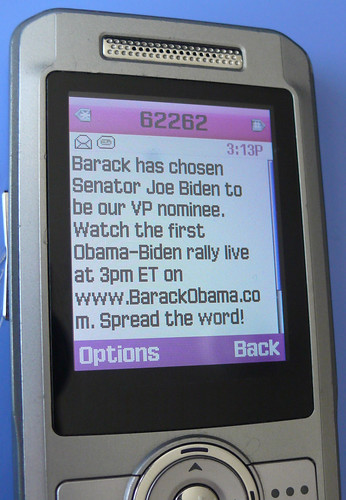For some people, the holiday season is the most wonderful time of the year. For me, it's presidential election season. There is no such thing as too much information or oversaturation. Given my obsession, it was only natural for me to sign up for Barack Obama's "First to Know" text message campaign.
I kept my phone out all day Friday anxiously awaiting the text between refreshes of Inkling's Obama-VP prediction markets. (I wasn't the only one.) But by the end of the work day, the text hadn't come, and word from the Internets said that the text would come Saturday.
At 1:53a on Saturday morning as I was putting shoes on and getting ready to leave a friend's house, I got the text:

There has been some criticism that it was a sham, that people didn't find out before the media and were disappointed, that it was a waste of time and anticipation. I strongly disagree.
First of all, anybody who thought that a large-scale SMS like this could be pulled off without a hitch is foolish. Different carriers have different delays. I frequently get text messages 4 hours after they are originally sent to me. That's just how it is right now. The Obama text was deployed just after 3am EST, midnight here in San Francisco. I didn't get it until 1:53a my time, just before last call. And not only were the networks flooded with the messages coming out from the Obama campaign, they were flooded with people immediately forwarding the message onto their friends and subsequent SMS exchanges. I sent and received at least 20 text messages within a half hour of receiving my text. I do think it's a bummer that some people never got the SMS but I hardly think that's grounds to call it a scam.
Second, while the New York Times and other major papers put the news online immediately, thus before many people had received their texts, the announcement was absent from some of the print editions of major papers, including the New York Times and the Wall Street Journal. Why? Because the text was sent after most of the Saturday editions had long been put to bed and were peeling off the presses. Sending this kind of information after the major papers have gone to press has traditionally been considered political suicide, but the Obama campaign knew what they were doing. The information was disseminated digitally, not via newsstands. Some critics think the 3am timing was a last dig on Hillary, but I think it was less a dig and more recognizing the importance of that 3am response.
According to some complaints from people who never received the text, I was lucky to get mine at all. But I can honestly say that I've never been so excited to receive a text message. I was nowhere near a computer when the text came, and hadn't received any tips from friends elsewhere in the country, so it was nice to be able to go out, have fun, and receive news like this via 2am SMS. My only real disappointment is that the text didn't start with "Hi, this is Barry!"
It's important to keep in mind that this was an experiment and it was not executed perfectly, but it does serve as a proof of concept. But what other politician has tried something like this on such a large scale? It was a great way for the Obama campaign to harvest phone numbers and build quite a buzz, but it was also a bold use of mobile technology—and great practice for November. As a friend put it, "The blogosphere can't quite yet eclipse the major news media. Heck, twitterverse was convinced it was bloomberg before the runup that day."
Of course, Biden's support of the DMCA and his friendliness with the RIAA are whole different issues...
— Jess Hemerly, August 2008

No comments:
Post a Comment